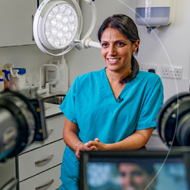RCVS publishes diversity and inclusion strategy

The strategy sets out how the RCVS and others can work together to improve diversity and inclusion in the veterinary professions.
The RCVS has launched a new strategy setting out plans to make the veterinary professions more inclusive and diverse.
Published on Wednesday (17 February), the RCVS Diversity & Inclusion Group (DIG) Strategy sets out how the RCVS and other organisations can work together to improve diversity and inclusion at all stages – from school-aged children who might be considering a career in the veterinary profession to engendering positive culture change for those already in it.
The strategy takes a holistic approach, with six work-streams including:
Recruitment to veterinary/veterinary nurse education and training: developing case studies, ambassadors and careers materials for school-age children from all backgrounds; commissioning research to better understand barriers to veterinary professions, and working with organisations that support applications from individuals of diverse backgrounds.
Retention and support within vet and VN education: updating veterinary school standards to reflect diversity & inclusion aspirations; implementing suggestions made during recent the RCVS and Veterinary Schools Council Roundtable for Black, Asian and Minority Ethnic (BAME) veterinary students and holding a similar event for BAME student veterinary nurses; and developing clear reporting systems and support for those who suffer from discrimination during extra-mural studies (EMS).
Recruitment within the profession: encouraging veterinary organisations and workplaces to take up recruitment awards/ standards eg Stonewall, Race at Work, and Disability Confident; helping employers understand the business, moral and societal case for diversity & inclusion; and, working with employers to develop a toolkit to support better recruitment practices and encourage people to call out poor examples.
Retention and support within the professions: strengthening standards regarding staff support within the Practice Standards Scheme; encouraging members of the veterinary team to attend diversity & inclusion training; producing materials that support difficult conversations; and, strengthening the RCVS Code of Professional Conduct to enable more confident reporting of poor behaviours.
Organisational policies and procedures: RCVS and other organisations within the DIG ensuring their policies promote and support diversity and inclusion; developing a toolkit to better support in-house conversations around diversity; and encouraging veterinary organisations to have regular discussions around diversity & inclusion and visible statements of intent.
Culture change: improving the diversity of governance/ leadership within the veterinary professions; ensuring diversity and inclusion is included in agendas at events, within CPD programmes etc; and enabling organisations to have, via the RCVS Diversity & Inclusion Group, a safe space to discuss progress and identify where they may need further help and guidance.
The RCVS DIG includes representation from the Association of Veterinary Students, BVA, the British Veterinary Ethnicity & Diversity Society, the British Veterinary LGBT+ Society, the BVNA, the Major Employers Group, SPVS and the Veterinary Schools Council. The group will be responsible for monitoring and evaluating progress within the six work streams on an ongoing basis.
Dr Niall Connell, RCVS senior vice-president and Chair of the DIG, said: “I’ve always been of the opinion that making the veterinary professions more diverse and reflective of British society at large, as well as protecting fellow professionals from discrimination, isn’t just a moral issue, but one that actually improves the quality of the profession and the outcomes we are delivering for our clients and patients.
“If we are losing colleagues to discrimination or just not attracting people from diverse backgrounds in the first place because they think it’s ‘not for people like them’, then we are losing out as a profession, and if we aren’t drawing on a diverse range of backgrounds, experiences, and attitudes in our work, then we are also potentially doing a disservice to our patients and clients. This is why this strategy is not just a case of being seen to be doing something but is actually crucial for the ongoing vitality and credibility of the veterinary team.
“It’s important to emphasise that this Strategy is a start and not an end in and of itself. There will be lots of hard work to be done and challenging conversations to be had, and results may not be quick or immediately obvious, but I am proud that we are taking a proactive approach and not just saying ‘things will change with time’.
Dr Mandisa Greene, RCVS President and DIG member, added: “Fulfilling this Strategy will involve a lot of hard work over the coming months and years but I am glad to say that many of the activities it outlines are already underway both at the RCVS and our partner organisations, building on the pioneering work that organisations such as the British Veterinary Association, British Veterinary Ethnicity & Diversity Society, the British Veterinary LGBT+ Society, Animal Aspirations and others have been undertaking.”



 The BSAVA has opened submissions for the BSAVA Clinical Research Abstracts 2026.
The BSAVA has opened submissions for the BSAVA Clinical Research Abstracts 2026.